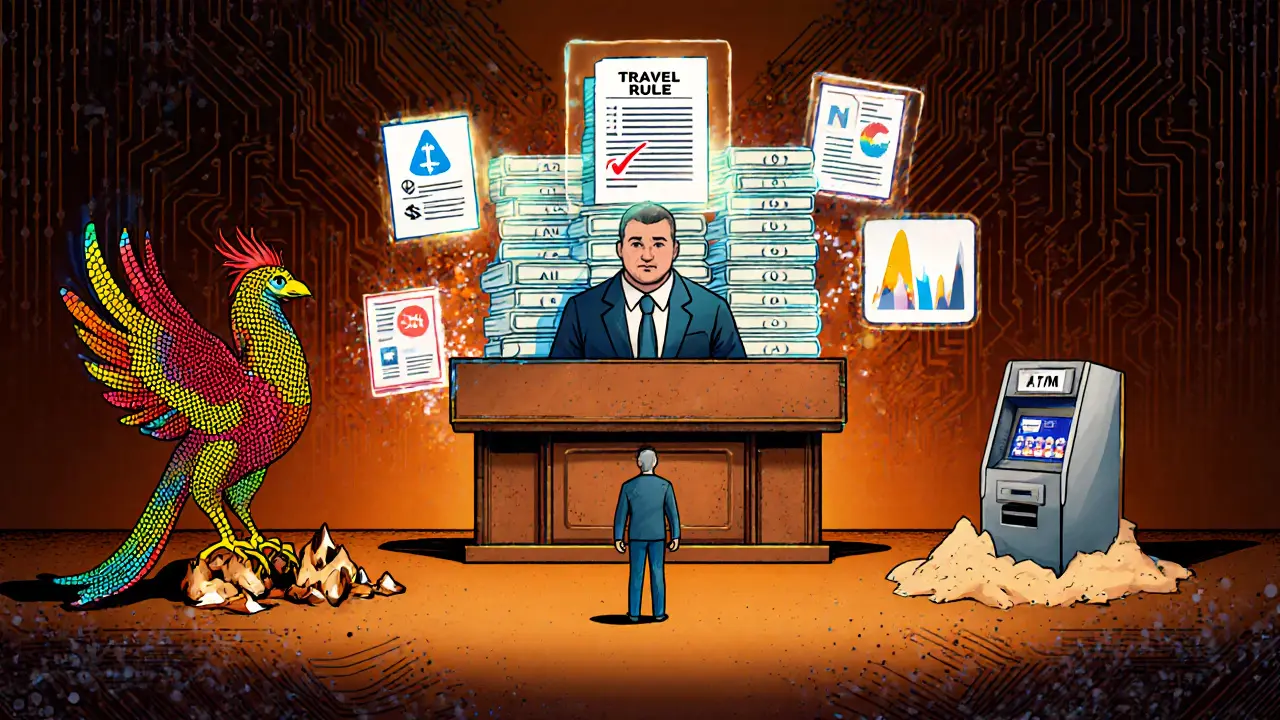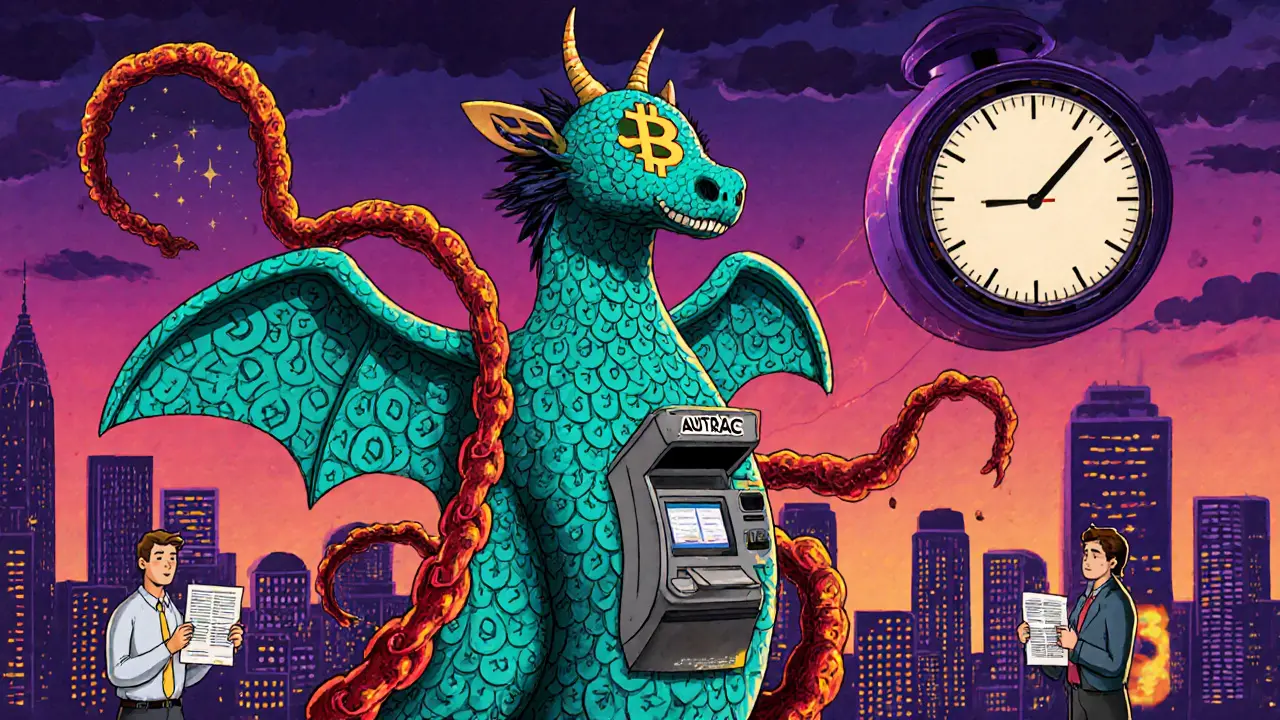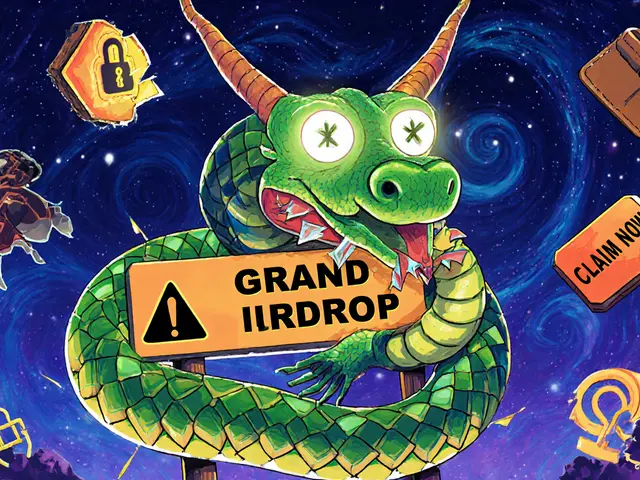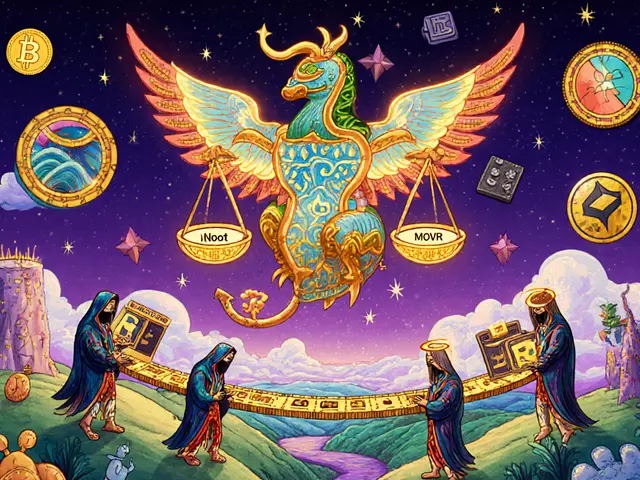AUSTRAC Compliance Deadline Calculator
AUSTRAC Compliance Deadline Calculator
Calculate how much time you have left to comply with AUSTRAC's March 31, 2026 registration deadline.
Australia’s crypto rules aren’t just changing-they’re catching up, and the clock is ticking
If you’re running a crypto exchange, custody service, or even a crypto ATM in Australia, you’ve got less than four months to get compliant-or shut down. As of March 31, 2026, every business offering virtual asset services must be registered with AUSTRAC and running a full anti-money laundering (AML) program. This isn’t a warning. It’s a deadline. And right now, only 47% of Australian crypto businesses are fully compliant.
What changed? In 2018, AUSTRAC only regulated crypto-to-fiat exchanges. Now, under the Anti-Money Laundering and Counter-Terrorism Financing Amendment Act 2024, the rules cover everything: crypto-to-crypto trades, custody wallets, token issuers, peer-to-peer transfer platforms, and even services that help people send digital assets. If you’re moving value digitally in Australia, you’re in scope.
What exactly counts as a virtual asset under Australian law?
AUSTRAC defines a virtual asset as: “a digital representation of value that can be transferred, stored or traded electronically.” That sounds broad-but it’s also narrow. Digital game tokens like Candy Crush coins? Excluded. Loyalty points like FlyBuys? Excluded. Stablecoins? Included. NFTs? Only if they’re used as a medium of exchange, not collectibles. Bitcoin? Yes. Ethereum? Yes. Dogecoin? Also yes.
The key is function, not form. If it’s used to pay for goods, send value, or hold wealth, it’s regulated. If it’s just a digital trophy or in-game currency, it’s not. This distinction matters because it forces businesses to track how their tokens are actually used-not just what they’re called.
The five services that now require AUSTRAC registration
Under FATF standards, Australia now regulates five types of virtual asset services. If you do any of these, you need to register:
- Exchanging virtual assets for fiat currency (like AUD)
- Exchanging one virtual asset for another (like BTC for ETH)
- Transferring virtual assets between users (even P2P)
- Safeguarding or administering virtual assets (custody wallets)
- Participating in financial services tied to asset issuance (like ICOs or STOs)
That means even a small startup offering a wallet app that lets users store Bitcoin and Ethereum must register. So must a platform that lets people trade Solana for Cardano. And if you run a crypto ATM, you’re now under the same rules as a bank.
The Travel Rule is here-and it’s stricter than you think
Starting March 2026, every virtual asset transfer over AUD 1,000 must carry full originator and beneficiary details. This is the Travel Rule, borrowed from traditional banking. It’s not optional. It’s not a suggestion. It’s law.
What does that mean in practice? If Alice sends 1.5 ETH to Bob, your platform must send Bob’s name, address, and ID number along with the transaction-even if it’s on a blockchain. This applies whether the transfer happens via blockchain, SWIFT, or a custom payment rail. No exceptions. No workarounds.
Companies like Independent Reserve spent months building systems to capture and transmit this data. Smaller exchanges? Many are still using spreadsheets. One Reddit user reported spending AUD 185,000 on compliance software just to meet the new customer due diligence (CDD) rules. For a two-person team, that’s more than their annual revenue.

Customer checks aren’t a one-time thing anymore
Before, you checked a customer’s ID when they signed up. Now, you have to monitor them continuously. If a user starts sending large, unusual transactions-especially to high-risk jurisdictions-you need to flag it. If they’re a politically exposed person (PEP), you need enhanced checks. And you need to keep records for seven years.
That’s a big shift. It’s no longer about onboarding. It’s about ongoing surveillance. AUSTRAC expects businesses to use blockchain analytics tools to detect suspicious patterns-like mixing services, chain hopping, or rapid transfers between wallets. If you’re not using tools like Chainalysis or Elliptic, you’re already behind.
Crypto ATMs are under the microscope
Australia has over 1,800 crypto ATMs-the most in Asia-Pacific. But many were used by scammers targeting older Australians. In July 2025, AUSTRAC launched a crackdown after identifying 90 scam victims linked to unregulated machines.
Now, every crypto ATM operator must meet minimum standards: identity verification at the machine, a AUD 50,000 bonding requirement, and real-time reporting of transactions. The bonding cost is controversial. Texas requires only USD 25,000. Some operators say Australia’s rules are punishing small businesses. But AUSTRAC says it’s about protecting vulnerable users. One provider voluntarily shut down after being denied renewal. Another paused operations. The message is clear: if you can’t comply, you don’t get to operate.
Where Australia falls short-and why it matters
Australia’s framework is technology-neutral, which is a strength. It applies the same rules to blockchain transfers as to bank wires. That avoids regulatory arbitrage. But it also leaves big gaps.
Decentralized finance (DeFi) platforms? Almost no guidance. If you run a non-custodial lending protocol or an automated market maker, you’re in legal limbo. AUSTRAC hasn’t said whether you need a license. 68% of Australian crypto businesses surveyed in September 2025 said this uncertainty is their biggest risk.
There’s also no regulatory sandbox. Singapore lets startups test new ideas under supervision. Australia doesn’t. That’s making it harder for local innovators to compete. As Professor Ross Buckley of UNSW Law Center put it: “Australia’s historically progressive stance on crypto adoption has fallen away.”
Who’s already compliant-and who’s struggling
Independent Reserve got fully licensed in Q1 2025. They reported a 22% rise in institutional clients after proving they met AUSTRAC’s standards. CoinSpot, on the other hand, suspended its P2P service in August 2025 because they couldn’t meet the new transaction monitoring requirements. The difference? Investment. Planning. Execution.
The top three exchanges-Independent Reserve, CoinSpot, and Swyftx-control 68% of the market. They have the resources. The small players? Many are still trying to figure out if they even need to register. The Australian Digital Commerce Association found 82% of businesses support the technology-neutral approach-but 74% are terrified of the lack of DeFi guidance.

The path to compliance: What you need to do now
If you’re a crypto business in Australia, here’s your checklist:
- Register on AUSTRAC’s online portal-don’t wait. The system is already accepting applications.
- Build a risk-based AML/CTF program: customer identification, ongoing monitoring, suspicious activity reporting.
- Integrate blockchain analytics tools to track transactions and detect red flags.
- Implement Travel Rule compliance: capture and transmit originator/beneficiary data for all transfers over AUD 1,000.
- Train your team on FATF standards and AUSTRAC’s updated rules (April 2025 version).
- Document everything. AUSTRAC will audit you.
Costs vary. For small exchanges, expect AUD 120,000-350,000 for software, legal help, and staff training. For larger firms, it’s higher. But the cost of non-compliance? Fines, suspension, or criminal charges.
What’s coming next? The big reforms in 2025-2026
AUSTRAC isn’t done. The March 2025 Digital Asset Statement laid out four pillars for future reform:
- A formal licensing system for Digital Asset Platforms (DAPs)
- A new Stored Value Facility (SVF) regime for stablecoins
- A review of Australia’s regulatory sandbox
- Investigations into blockchain’s economic benefits
Final rules for these changes are expected by December 2025. If you’re waiting to see what happens, you’re already late. The March 2026 deadline is fixed. The rest is just detail.
What happens if you don’t comply?
Non-compliance isn’t a slap on the wrist. AUSTRAC can:
- Refuse or cancel your registration
- Impose fines up to AUD 21 million
- Refer you to the Australian Federal Police for criminal prosecution
- Publicly name your business as non-compliant
One crypto ATM provider was denied renewal. Another withdrew voluntarily. A third paused operations. These aren’t isolated cases. They’re warnings.
The message from AUSTRAC is unambiguous: if you’re in the crypto space in Australia, you’re now part of the financial system. And the system doesn’t tolerate anonymity.
Final thoughts: Compliance isn’t optional-it’s survival
Australia’s crypto market is growing fast. AUD 4.7 billion in 2025. 3.2 million users. 1,800 ATMs. But growth without regulation breeds risk. Scams. Laundering. Loss of trust.
AUSTRAC’s new rules are tough. They’re expensive. They’re complex. But they’re also necessary. The businesses that survive won’t be the ones with the fanciest apps or the biggest marketing budgets. They’ll be the ones that took compliance seriously-early.
By March 2026, the market will reset. The compliant will thrive. The rest will disappear.
Do I need to register with AUSTRAC if I only trade crypto for myself?
No. Individual users who buy, sell, or hold crypto for personal use don’t need to register with AUSTRAC. The rules only apply to businesses offering virtual asset services-like exchanges, wallets, or ATMs. If you’re not running a service for others, you’re not regulated.
What if I run a crypto business from overseas but serve Australian customers?
You still need to register. AUSTRAC’s rules apply to any business that provides services to users in Australia-even if you’re based overseas. If your website accepts AUD, markets to Australians, or processes transactions from Australian IP addresses, you’re in scope. Ignoring this has led to enforcement actions against offshore platforms.
Are NFTs regulated under AUSTRAC’s rules?
Only if they’re used as a medium of exchange. If you’re selling an NFT as a digital artwork or collectible, it’s not regulated. But if your platform lets people trade NFTs for Bitcoin or AUD, or use them to pay for goods, then your service falls under AUSTRAC’s rules. The key is function-not form.
How do I know if my DeFi platform needs a license?
Right now, there’s no clear answer. DeFi platforms-especially non-custodial ones-are largely unaddressed in current regulations. AUSTRAC hasn’t issued guidance. Most experts advise treating DeFi services as high-risk until official rules are published. If your platform holds user funds, facilitates trades, or issues tokens, you should assume you need to register. Consult a legal expert familiar with Australian AML/CTF law.
Can I use free blockchain analytics tools to meet compliance?
Probably not. AUSTRAC expects businesses to use professional-grade tools that can track complex transaction patterns, link wallets to real identities, and generate audit-ready reports. Free tools lack the accuracy, coverage, and reporting features needed for compliance. Most regulated businesses use paid services like Chainalysis, Elliptic, or CipherTrace. Skipping this step risks failing an audit.
What happens after March 31, 2026?
AUSTRAC will begin active enforcement. Registered businesses will be subject to random audits. Unregistered platforms will be blocked from payment processors, banking services, and app stores. Non-compliant operators may face criminal charges. The regulator has already shown it’s willing to shut down operators-it won’t wait long to act.











16 Comments
lol i just bought dogecoin last week and now i’m scared to send it anywhere
Let’s be real-the Travel Rule is the death knell for true P2P crypto. You can’t have decentralization and KYC/AML baked into every transaction. This isn’t regulation, it’s financial surveillance dressed up as compliance. The FATF doesn’t care about innovation-they care about control.
And don’t get me started on the cost. A two-person shop spending $185K on Chainalysis? That’s not a compliance burden-it’s a market barrier designed to protect incumbents. Welcome to the cartel.
Oh sweet mercy. So now my 17-year-old nephew’s NFT of a crying cat is ‘regulated’ if he sells it for ETH? What’s next-taxing memes?
The real issue isn’t compliance-it’s clarity. Australia’s framework is technically sound, but it’s missing the nuance for DeFi. Non-custodial protocols don’t have a ‘business’ to register. They’re code. They’re protocols. They’re not a company with a CEO sitting in Sydney.
By forcing every service into the same box, regulators are creating a legal black hole for innovation. If you can’t define who’s responsible, you can’t regulate them. And that’s exactly what’s happening.
Compare this to Singapore’s sandbox. There, you build, you test, you learn. Here? You’re expected to know the rules before you even write the first line of code. That’s not innovation-friendly. It’s innovation-hostile.
For anyone panicking about the $350K cost-don’t. Look at Independent Reserve. They turned compliance into a competitive advantage. Institutional investors are flocking to them because they trust the audit trail. Compliance isn’t a cost center-it’s a trust engine.
Start small. Use open-source tools for basic monitoring. Partner with a legal firm that specializes in crypto AML. Don’t try to boil the ocean. Focus on the five core services. Document everything. And remember: AUSTRAC wants you to succeed. They just won’t tolerate negligence.
This isn’t about fear. It’s about building a sustainable future for crypto in Australia. The businesses that survive won’t be the loudest. They’ll be the most responsible.
They’re using this to track us. Every transaction. Every wallet. Every damn NFT. This isn’t about money laundering-it’s about control. The same people who pushed for digital IDs are now pushing for blockchain surveillance. They want to know who you are, what you own, and who you’re sending money to. And they’re calling it ‘compliance’.
Remember when they said Bitcoin was for criminals? Now they’re using the same fear to justify total financial visibility. The ‘scams’ they cite? 90 victims out of 3.2 million users. That’s 0.0028%. But now every single exchange has to spend millions to track them?
This is the slippery slope. First crypto. Then DeFi. Then CBDCs. Then your bank account. They’re not protecting you. They’re preparing for total financial capture.
And don’t tell me ‘it’s for safety.’ If I want safety, I’ll keep my money under the mattress. I don’t need the state watching my every trade.
They’re not regulating crypto. They’re killing it with kindness.
There is, in the philosophical sense, a profound tension between the ethos of decentralization and the institutional imperative of accountability. The Australian model, while technologically neutral, imposes a centralized epistemology upon a distributed ontology. One cannot regulate an emergent network by forcing it into the architecture of legacy financial hierarchies.
When AUSTRAC demands originator and beneficiary data for blockchain transfers, it is not merely enforcing AML protocols-it is attempting to reify anonymity as a flaw rather than a feature. The blockchain does not lie. It does not need to be surveilled. It records. It verifies. It is the ledger of truth.
Yet we are asked to overlay a system of human bureaucracy upon a system of cryptographic certainty. The result is not security. It is fragility. The compliance software, the audits, the bonding requirements-they are not shields. They are mirrors. They reflect our fear of the unknown, not our mastery of it.
Perhaps the true risk is not money laundering. It is the erosion of the right to private value exchange. And if we surrender that right under the banner of safety, what remains of the promise of crypto?
I do not oppose regulation. I oppose the illusion that regulation can be meaningfully applied to a system designed to operate beyond its reach.
So let me get this straight-Australia is spending millions to shut down crypto ATMs because 90 people got scammed? Meanwhile, the banks are laundering billions through shell companies and nobody bats an eye. Classic. The real criminals are the ones in suits with government contracts.
And now they want to make every small business pay $300K to play by their rules? Good. Let them go bankrupt. Then the big boys-CoinSpot, Swyftx, the ones with lobbyists-take over. That’s the whole plan. Crush the little guys. Monopolize the market. Call it ‘compliance.’
Don’t fall for it. This isn’t about protecting Australians. It’s about protecting the banks. And if you’re still using crypto, you’re already the enemy.
Mark my words: this is the first step toward a national digital ID tied to every crypto transaction. The moment AUSTRAC starts collecting beneficiary data for every $1,000 transfer, they’re building the backbone of a social credit system. You think they won’t link this to Medicare? To your tax file? To your driver’s license?
The ‘Travel Rule’ is not a financial regulation. It’s a behavioral tracking protocol. Every time you send ETH, you’re feeding a database that will eventually determine your credit score, your insurance rates, your employment eligibility.
And don’t believe the lie that ‘only criminals are worried.’ If you’re not worried, you haven’t read the history of surveillance states. They always start with ‘just this one thing.’ Then they expand. Then they normalize. Then they own you.
There is no such thing as ‘limited’ surveillance. Once the infrastructure exists, it will be used. Always.
Okay so I just spent 3 hours reading this whole thing and I’m emotionally drained but also weirdly motivated?? Like I get it-Australia’s trying to be the Singapore of crypto but with more rules and less chill. But honestly? The Travel Rule is a nightmare for small devs. Imagine trying to build a wallet that auto-sends ID data for every transaction over $1K? That’s not tech-that’s a legal minefield wrapped in a spreadsheet.
And the NFT thing? Bro. I have a friend who sells pixel art NFTs for $20. Now he has to verify every buyer’s address? What if someone buys it with Monero? Do we need a notary? A notary with a blockchain analytics subscription??
Also-why is it that when a bank moves $20 million between offshore accounts, it’s ‘corporate finance’ but when I send $1,500 in ETH to my cousin in Canada, it’s ‘money laundering’? Double standards are the real scam here.
And the bonding requirement for crypto ATMs? $50K? In Texas it’s $25K. So Australia’s just trying to out-regulate everyone? That’s not leadership. That’s insecurity.
But… I kinda respect that they’re not pretending crypto is some wild west. They’re saying: if you want to play, you play by the rules. And maybe that’s the only way this survives long-term. Even if the rules suck.
Still. I’m gonna wait until 2027 to start my exchange. Let the first wave get crushed. I’ll take the leftovers.
How is this even legal? Australia is effectively exporting its regulatory overreach to every crypto service that touches an Australian IP address. This is digital colonialism. You don’t get to dictate rules to global infrastructure just because your citizens occasionally fall for scams.
And let’s not pretend this is about ‘protecting the vulnerable.’ It’s about control. The moment a government demands real-name data for peer-to-peer transfers, you’re no longer in a free market-you’re in a managed economy.
It’s telling that the only entities thriving under these rules are the ones with deep pockets and government connections. The rest? They’re collateral damage. And we’re supposed to applaud them for ‘doing the right thing’?
What a farce.
Look, I’m not anti-regulation. I’m anti-bureaucracy. If you’re running a crypto ATM and you can’t afford $50K in bonding, you shouldn’t be in the game. But if you’re a 2-person team trying to build a wallet for artists, why are you being treated like a bank?
The problem isn’t the rules. It’s the one-size-fits-all approach. A DeFi protocol shouldn’t need a compliance officer. A P2P swap app shouldn’t need to log every user’s passport. This isn’t innovation-it’s institutional mimicry.
They’re trying to make crypto look like Wall Street. But crypto’s whole point is that it doesn’t have to.
Maybe the real answer isn’t more rules. Maybe it’s better education. Better tools. Maybe let the market figure it out instead of forcing it into a suit.
Hey, I just started a small NFT gallery and I was wondering-do I need to register if I only accept crypto for prints? Like, I’m not trading tokens, I’m selling art. But people pay with ETH. Does that count as a ‘virtual asset service’? I’m so confused.
I love crypto, but this feels like trying to build a sandcastle while a hurricane is blowing.
Who the hell cares about some Australian regulator? This is why the US needs to wake up. We’re letting Europe and Australia dictate crypto policy. We got the talent. We got the innovation. Why are we letting them turn it into a compliance nightmare?
They think they’re being smart? Nah. They’re just scared. And scared people make bad laws.
Mark my words: in 5 years, every Australian crypto business is gonna be bought by an American firm that didn’t bother registering. Because we don’t do this nonsense here.
Just saw Michelle’s question above. If you’re selling physical goods (prints) and accepting crypto as payment, you’re not a virtual asset service provider-you’re a merchant. AUSTRAC’s rules don’t apply to merchants. Only to platforms facilitating asset transfers.
You’re fine. But keep records of your sales. And if you start letting people trade the NFTs you mint on your site? Then you need to register. But for now? Just invoice like a normal business. No need to panic.
You’re doing the right thing by asking. That’s half the battle.
For those concerned about the Travel Rule’s technical feasibility: the industry is already developing standardized protocols-like the FATF’s Travel Rule Implementation Framework and the Interbit framework. These allow for encrypted metadata transmission without exposing PII to intermediaries. It’s possible. It’s just expensive.
And yes, free tools won’t cut it. Chainalysis isn’t just a ‘tool’-it’s an intelligence platform with global wallet clustering, behavioral modeling, and jurisdictional risk scoring. You wouldn’t run a bank with Excel. Don’t run a crypto service with a free blockchain explorer.
Compliance isn’t sexy. But neither is getting shut down by federal authorities.